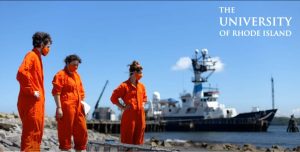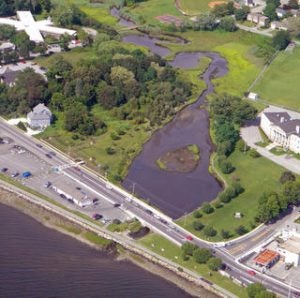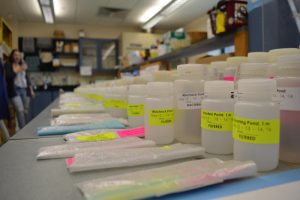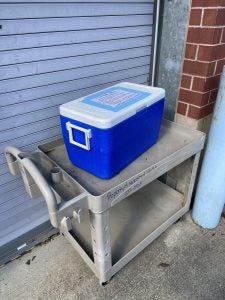URI Watershed Watch Blog
#5 – URIWW working with URI researchers on microplastics
Did you know that microplastics – tiny bits of plastic that are shed by our clothes or the result of weathering/breaking down of the now nearly ubiquitous plastic waste found in the environment – can be found in waterbodies throughout the world? Researchers at URI are working to learn more about microplastics in RI’s freshwater, and engaging URIWW volunteers in the process. To learn more about this they have created a great video that you can watch here by clicking HERE.
the result of weathering/breaking down of the now nearly ubiquitous plastic waste found in the environment – can be found in waterbodies throughout the world? Researchers at URI are working to learn more about microplastics in RI’s freshwater, and engaging URIWW volunteers in the process. To learn more about this they have created a great video that you can watch here by clicking HERE.
Want to learn more about microplastics? Check out this article in Nature (click here).
#4. Brilliant Data & Maps – Making sense of water quality through the watershed
 If you are a Volunteer Monitor, I suspect you love the waterbody you monitor. You care about it so much that you are willing to spend part of your spring, summer and fall on the water and collecting important water quality data. You see your reflection in the water and reflect on how it can be so clear. Or maybe wonder why it looks a little cloudy today or maybe even really green. You stare at the new current data hub to try to learn more (and yes, we will be having some training on how to use it in the future!). You wonder what makes such a difference in waterbodies around the state.
If you are a Volunteer Monitor, I suspect you love the waterbody you monitor. You care about it so much that you are willing to spend part of your spring, summer and fall on the water and collecting important water quality data. You see your reflection in the water and reflect on how it can be so clear. Or maybe wonder why it looks a little cloudy today or maybe even really green. You stare at the new current data hub to try to learn more (and yes, we will be having some training on how to use it in the future!). You wonder what makes such a difference in waterbodies around the state.
One difference between lakes, ponds, reservoirs, rivers, and even coastal waters is the watershed. A watershed is all the land area that drains to a specific waterbody. What water moves through and the contaminants it picks up will discharge into the waterbody. So, what’s in your watershed?
Watershed maps can help tell the story. If the watershed is mostly forested, mostly clean water is draining to the waterbody. On the other hand, if the watershed is a mix of dense neighborhoods, commercial businesses and some farm fields, chances are there will be more pollutants getting into this waterbody.
To learn more, please visit the Story Map with local examples. From there you can download some maps of 49 lakes in the URI Watershed Watch program. A URI graduate student created a base map and a watershed map for each of the 49 locations. We hope that you learn about your local watersheds through these maps and maybe get some big ideas to help keep our waters clean or improve their conditions.
Questions or ideas for another blog – email Kelly Addy at kaddy@uri.edu
#3. Celebrating Volunteers’ Milestones
Not a usual blog post since the hard work and commitment of these volunteers who celebrated 5, 10, 15, 20, 25 and 30 years of monitoring speaks for itself!
Congratulations and thank you!!
Be sure to click the file below to celebrate the achievements:
2021 Volunteer Recognition List
#2. Five lessons learned through monitoring water quality during a Pandemic
We are thankful for all the volunteers that faithfully go out regularly to collect water quality data on lakes, rivers, beaches, and estuaries in RI, CT and now MA and NY for URI Watershed Watch. On an average year, these volunteers take three to five (or more!) pilgrimages to the Watershed Watch laboratory in Kingston, RI to deliver water samples on an arranged schedule. They go out on the water at the suggested times and brave the elements – sometimes humid heat, cool weather, and even some rain (but never dangerous weather!). In 2020, challenges brought on by the pandemic made us uncertain if there would even be a monitoring season! But our volunteers were anxious to get out on the water! They stepped up to make sure water quality was documented despite the pandemic! We learned several lessons…
- Flexibility: When we learned we would not be able to have in-person training, Elizabeth Herron created training videos that were posted on this website. When we discovered that volunteers would not be allowed into the building, staff coordinated pickups for equipment and bottles and drop-offs for water samples on a seemingly magical cart in the loading dock. Volunteers loved this flexibility and it will be part of the program into the future!
- Greater Dedication: Our volunteers love to get out on the water and monitoring provided a chance to forget the pandemic for a little while. During the pandemic, everyone seemed to want to get out into nature – new volunteers stepped up too. Despite a delay in starting the season, volunteer data was almost seamless! Greater dedication to getting quality data will continue into 2021!
- New Tricks: We launched a new online tool that enabled our volunteers to upload their weekly/biweekly data directly online so we can get it in and presented in a timelier manner. We had some kinks, but we learned a lot from you. We have been tweaking it and we hope you will be excited to use these new tricks! This new data dashboard will be presented at our spring Zoom meeting too.
- Family Fun: During the pandemic, families stuck together more. Volunteer water quality became a family activity. Memories were created and this family activity will be embraced for some time!
- Wanting More: While the pandemic continues, we know you are really looking forward to picking up your equipment and heading out on the water in April. We had a slower start last year, but we are already preparing for spring. And we may offer additional volunteer opportunity this spring too.Please share with us any other lessons you learned as a URI Watershed Watch volunteer during the pandemic! We love hearing from you and value your experiences.
~Kelly Addy, URI Watershed Watch Program Coordinator, kaddy@uri.edu
#1. Exceeding Expectations

We will soon be starting the 2020 URI Watershed Watch monitoring season. We are doing the things we usually do this time of year (“we” being mostly Elizabeth Herron – Program Director – and her students in the URI WW lab). There is a lot of cleaning up the equipment, brainstorming any updates to manuals or trainings, recruiting new volunteers and reaching out to seasoned volunteers.
One of the recent new volunteers recently explained, “Wow! You are much more organized than I expected!” I get what he was saying; maybe grassroots organizations may fly by the seat of their pants. This comment was very welcomed! Doesn’t everyone love to exceed expectations?! We must have something going for us to be entering our 33rd year of monitoring RI (and beyond) waters. Many of the kinks have been worked out. We appreciate the service of our volunteers. We try to care and feed our volunteers so that they want to reach beyond expectations too. We focus heavily on training our volunteers well and make sure the methods make sense. These details make sure that we can provide the State of RI and organizations high quality data. Who knew a volunteer group could do all of this?!
However, sometimes doing things the same way can lead to stagnation or not meeting expectations. We recently assessed some of our outreach methods. We know we need to change some things up. For instance, we were so busy doing our work that our website took a back seat for a while. We just launched this new website that looks more visually appealing and easier to find what you are looking for (we hope you agree – certainly give us feedback on it!). Other ways we know we are not meeting expectations are providing you timely data delivery, having an easy-to-use online data entry, and engaging in social media. We are working on it! We have staff looking at organizing our data stream to transform it so it’s ready to post on the website while the season is still happening! We are examining maps to help you learn more about your watersheds. We are planning to launch a new online data entry tool that will be easier. Our students (aka, the experts in this area) may help us make URI WW more effective on social media. And we are attempting video training! Please be patient for these changes – there is light at the end of the tunnel! Our goal is to exceed your expectations more and more.
And lastly, THIS BLOG! We would like to use it as a new way to market URI WW, build our audience, and get out useful info. We need your help! The stories of our volunteers, your experiences on the water or how you are making small changes in your watershed and waterbodies will keep people coming back to this page and grow our community. Message me (Kelly Addy, kaddy@uri.edu) if you want to contribute a blog. I’d love to assist you! Let’s all strive to exceed expectations!

